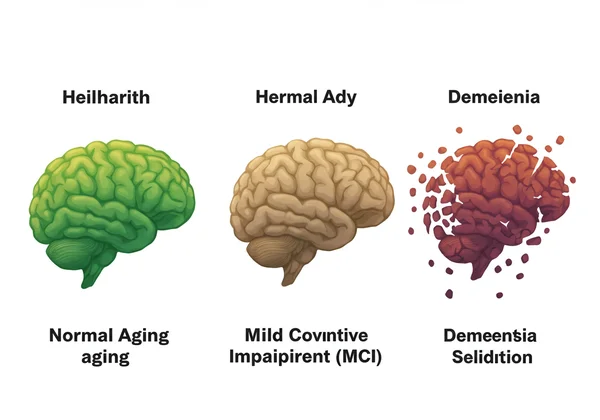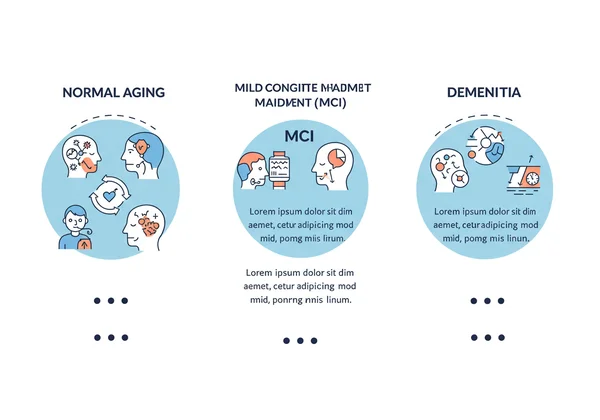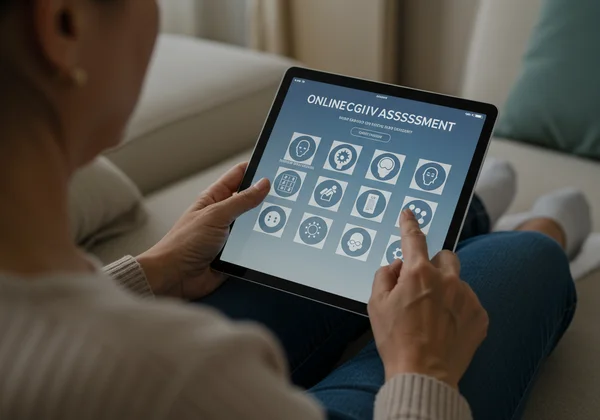Age-Related Cognitive Changes: Normal Forgetfulness vs. Dementia, and the Role of Cognitive Tests
November 11, 2025 | By Audrey Fletcher
Navigating the natural shifts in our brain as we age can be a source of anxiety and confusion. Many of us have experienced that fleeting moment of forgetting a name or misplacing our keys, leading to a nagging question: Is this just a normal part of getting older, or is it a sign of something more serious? This guide demystifies age-related cognitive changes, explaining normal forgetfulness, Mild Cognitive Impairment (MCI), and the warning signs of dementia. We'll also explore what a cognitive test consists of and how it can empower you with knowledge and clarity.
For those looking to establish a baseline for their cognitive health, a proactive approach can make all the difference. Understanding your cognitive profile is the first step, and tools like an online cognitive assessment provide a structured way to gain valuable insights.
What are Normal Age-Related Cognitive Changes?
As we grow older, our bodies change, and our brains are no exception. Just as our physical stamina might decrease, some cognitive processes may become less efficient. This is a natural, expected part of aging and is often referred to as age-associated memory impairment. These changes are typically subtle and don't significantly interfere with your ability to live an independent, fulfilling life.

These shifts are often related to a slight decline in the speed of information processing or a reduced ability to multitask. However, other functions, such as vocabulary and wisdom gained from life experience, can actually improve with age.
Common Examples of Everyday Forgetfulness
So what do these changes look like in daily life? Normal, age-related forgetfulness involves minor, occasional memory lapses that don't disrupt your routine.
Here are some relatable examples:
- Forgetting where you parked your car at the mall.
- Walking into a room and momentarily forgetting why you went in.
- Occasionally having trouble finding the right word in a conversation (the "tip-of-the-tongue" phenomenon).
- Misplacing common items like glasses or a remote control.
- Forgetting the name of an acquaintance you don’t see often.
The key distinction is that you usually remember the information later or can retrace your steps to find what you were looking for. These moments are inconvenient but not alarming.

The Brain's Natural Aging Process: What to Expect
Underneath these everyday experiences, the brain is undergoing subtle changes. Certain regions, particularly the hippocampus and prefrontal cortex—areas vital for memory and complex thinking—may experience some shrinkage. The communication between neurons can become slightly less effective, and blood flow might decrease.
These biological shifts explain why it might take a bit longer to learn a new skill or recall information compared to when you were younger. This is not a sign of disease but rather the brain adapting and evolving over a lifetime.
Beyond Normal: Understanding Mild Cognitive Impairment (MCI) Symptoms
While some cognitive slowing is normal, there's a stage that falls between typical aging and the more severe decline of dementia. This is known as Mild Cognitive Impairment (MCI). A person with MCI has more memory or thinking problems than other people their age, but these symptoms are not severe enough to significantly interfere with their daily life or independence.
Recognizing MCI is important because some individuals with this condition are at an increased risk of developing dementia later on. However, not everyone with MCI will progress; for some, it may remain stable or even improve.
What Differentiates MCI from Typical Aging?
The primary difference lies in the frequency and consistency of the cognitive issues. While a typically aging person might forget a detail of an event, someone with MCI might forget the entire event ever happened. Concerns about their memory are often more pronounced and may be noticed by family and friends.
Unlike normal forgetfulness, the memory lapses in MCI are more persistent. Someone might repeatedly ask the same questions or struggle to follow conversations, which goes beyond the occasional slip-up.
Key Indicators and Early Warning Signs of MCI
Identifying the early signs of MCI is the first step toward managing it. These indicators are more noticeable than the minor lapses associated with normal aging.
Common signs include:
- Losing things often and being unable to retrace steps to find them.
- Forgetting important events such as appointments or social engagements.
- Struggling with planning, problem-solving, or making decisions.
- Feeling increasingly overwhelmed by tasks that were once easy.
- Having greater difficulty with word-finding than is typical for their age.
If you or a loved one are experiencing these symptoms, it may be time to monitor your cognition more formally and discuss your concerns with a healthcare professional.
Risk Factors and Potential Causes for MCI
The exact cause of MCI is not fully understood, but several risk factors are associated with it. These are often the same factors linked to dementia, including advancing age, a family history of Alzheimer's disease, and certain genetic markers.
Lifestyle factors also play a significant role. Conditions like high blood pressure, high cholesterol, diabetes, and obesity can increase the risk. Conversely, maintaining physical activity, a healthy diet, and social engagement may help protect cognitive function.
Differentiating Normal Aging, MCI, and Dementia
Understanding the distinctions between these three states is vital for managing expectations and seeking appropriate care. The progression is not a simple line but a spectrum of cognitive health.
A Comparative Look at Symptoms and Progression
Let's break down the differences in a clear way:
-
Normal Aging: Involves occasional memory lapses (e.g., forgetting a name) but does not impact daily functioning. You are still able to manage finances, drive, and live independently.
-
Mild Cognitive Impairment (MCI): Memory and thinking problems are more frequent and noticeable to yourself and others. You might need reminders or more effort to complete complex tasks, but your independence in daily activities is largely intact.
-
Dementia: Cognitive decline is severe enough to interfere with daily life and independence. An individual may struggle with basic tasks like dressing, eating, or personal hygiene. They may get lost in familiar places and have significant trouble with communication and judgment.

When to Be Concerned: Red Flags to Prompt Medical Consultation
It's time to consult a doctor when cognitive changes begin to impact safety, independence, or daily routines. Red flags include difficulty managing finances, forgetting to take medications, personality changes like increased agitation or suspicion, and getting lost in familiar surroundings.
A proactive approach involves tracking these changes. Taking a scientifically validated test can provide objective data to share with a healthcare provider, making that conversation more productive.
Delving Deeper into Dementia: Types and Comprehensive Signs
Dementia is not a specific disease but an umbrella term for a range of conditions characterized by a severe decline in cognitive function. It represents a significant step beyond normal aging and MCI.
What is Dementia? An Overview of Common Types (e.g., Alzheimer's, Vascular)
While there are many forms of dementia, a few are most common:
- Alzheimer's Disease: The most prevalent type, accounting for 60-80% of cases. It's characterized by the buildup of plaques and tangles in the brain, leading to a progressive decline in memory and other cognitive skills.
- Vascular Dementia: Occurs due to brain damage from reduced or blocked blood flow, often after a stroke or a series of mini-strokes. Symptoms can appear suddenly and may vary depending on the affected area of the brain.
- Lewy Body Dementia: Involves abnormal protein deposits (Lewy bodies) in the brain. It shares symptoms with both Alzheimer's and Parkinson's disease, including memory loss, movement problems, and visual hallucinations.
The 10 Warning Signs of Dementia to Know
The Alzheimer's Association has outlined ten key warning signs that can help differentiate dementia from normal age-related changes. These include:
- Memory loss that disrupts daily life.
- Challenges in planning or solving problems.
- Difficulty completing familiar tasks.
- Confusion with time or place.
- Trouble understanding visual images and spatial relationships.
- New problems with words in speaking or writing.
- Misplacing things and losing the ability to retrace steps.
- Decreased or poor judgment.
- Withdrawal from work or social activities.
- Changes in mood and personality.
The Impact of Dementia on Daily Life and Function
The progression of dementia ultimately affects every aspect of a person's life. It impacts their ability to communicate, reason, and manage emotions. Daily activities that were once second nature, like cooking a meal or getting dressed, become difficult or impossible without assistance. This profoundly affects not only the individual but also their family and caregivers, highlighting the importance of early detection and planning.
The Role of Cognitive Assessments in Monitoring Brain Health
In the face of these concerns, knowledge is power. Cognitive assessments are standardized tools designed to measure various thinking skills, such as memory, attention, and problem-solving. They provide an objective snapshot of your cognitive function, helping to establish a baseline and track changes over time.
Why Consider an Online Cognitive Test for Early Insights?
An accessible, scientifically grounded online cognitive test serves as an excellent first step. It offers a private, convenient way to gather preliminary information about your cognitive health from the comfort of your home. For proactive individuals or concerned family members, it provides a data-driven starting point for understanding cognitive strengths and weaknesses.

How Our Cognitive Test Platform Can Help You Track Changes Over Time
Our platform is designed to provide a comprehensive evaluation of 22 core cognitive skills. Developed by neuropsychologists and data scientists, it offers a reliable way to monitor your brain health. By taking the assessment periodically, you can track your performance over time, helping to identify any significant changes that may warrant a discussion with a medical professional. This longitudinal view is far more powerful than a one-time snapshot.
Interpreting Your Results: What Happens After Taking a Test?
After completing the 30-40 minute assessment, you receive an immediate summary of your performance. For a deeper understanding, our AI can generate a personalized, comprehensive report that explains your cognitive profile in easy-to-understand language. This report highlights your strengths, pinpoints areas of challenge, and offers actionable suggestions for supporting your brain health. It's a tool for empowerment, not diagnosis.
Empowering Yourself with Knowledge and Proactive Steps for Brain Health
Understanding the difference between normal forgetfulness, MCI, and dementia is essential for navigating the aging process with confidence. While some cognitive changes are a natural part of life, recognizing the red flags allows for early intervention and planning. Proactive monitoring provides the knowledge needed to take control of your brain health journey.
Are you ready to gain a deeper understanding of your cognitive profile? Start your free test today and take the first step towards empowered, proactive brain health management.
Your Questions Answered About Age-Related Cognitive Changes
What does a cognitive test consist of and why is it important?
A cognitive test is a series of standardized tasks designed to measure different aspects of your thinking, such as memory, attention, language, and problem-solving. It's important because it provides an objective measure of your cognitive function, helping to establish a baseline that can be used to track changes over time. This data can be invaluable for early detection of potential issues.
Can I take a reliable cognitive test online for free?
Yes, you can. Our platform provides a scientifically validated cognitive assessment at no cost. It is developed based on established neuropsychological principles to ensure reliability and provides a comprehensive overview of your cognitive abilities, making high-quality screening accessible to everyone.
What if I have concerns about my cognitive test score?
A cognitive test score is a piece of information, not a diagnosis. If your results cause you concern, the most important next step is to share the report with your doctor or a qualified healthcare professional. They can interpret the results in the context of your overall health, medical history, and other factors to determine the appropriate course of action.
How is a scientific cognitive test different from free brain games?
While brain games can be engaging, a scientific cognitive test is fundamentally different. It is designed and validated to measure specific cognitive domains systematically, based on established neuropsychological standards. Our scientific cognitive test provides a structured assessment and a comprehensive report on 22 different skills, offering a reliable health screening tool rather than just entertainment.
Disclaimer: This article is for informational purposes only and does not constitute medical advice. The cognitive test offered on this website is a screening tool and is not a substitute for a professional clinical diagnosis. Please consult with a qualified healthcare provider for any health concerns or before making any decisions related to your health or treatment.